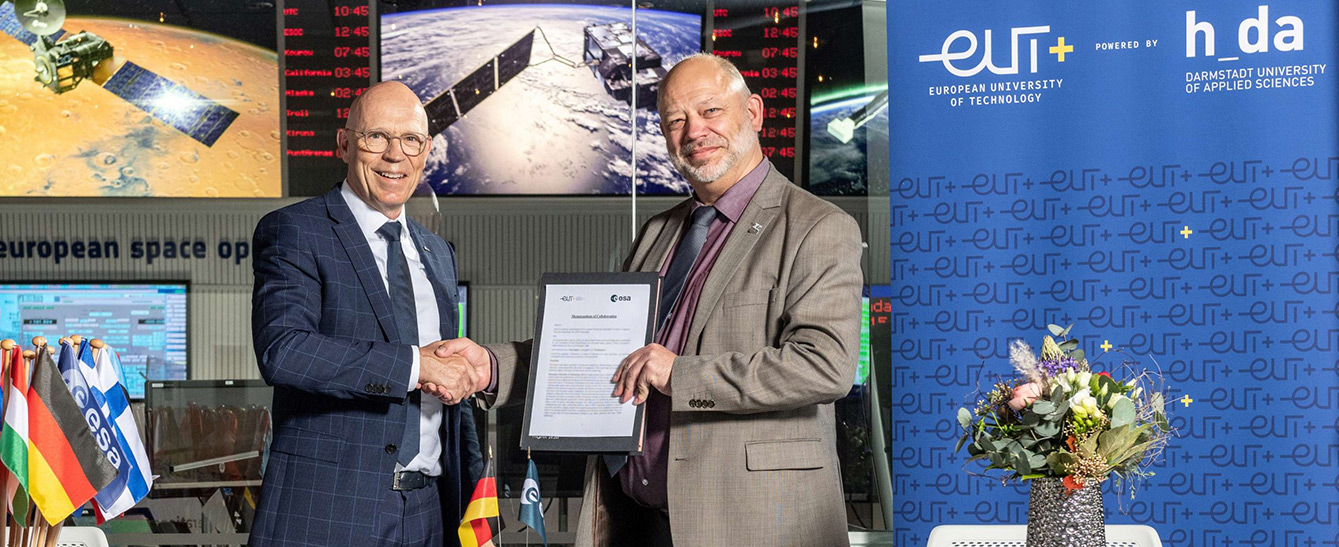- Home
Darmstadt University of Applied Sciences, EUt+ and ESA intensify cooperation
Published on May 4, 2022
–
Updated on May 10, 2022

Dates
on the April 25, 2022
Darmstadt – Darmstadt University of Applied Sciences (h_da) as part of the European University of Technology (EUt+) and the European Space Agency ESA are intensifying their cooperation. Prof. Dr. Arnd Steinmetz, h_da President, and Dr. Rolf Densing, Director of Operations at ESA, today signed the corresponding agreement. The "Memorandum of Collaboration" defines the framework for joint lecture series or master theses, starting with main topics like artificial intelligence, cyber security and life cycle analysis.
The agreement foresees to deepen the collaboration in the near future including additional space-specific topics such as "Space Operations" and "Space Safety". The benefits on both sides are obvious: While researchers establish new scientific networks, students have the opportunity to work on projects with the European space technology partner at an early stage of their professional carrier. For ESA, in turn, applied research on topics such as AI, cybersecurity and lifecycle assessment is of increasing importance to manage its large number of assets in the form of spacecraft or ground stations.
"This cooperation is a big step for h_da and its EUt+ partner universities,” says h_da President Prof. Dr. Arnd Steinmetz. „I am happy for our students, for whom completely new opportunities are opening up. Also for our partners in Riga and Cartagena, who will now have access to ESOC for their aerospace engineering departments and students. We will continue to further advance this collaboration."
Dr. Rolf Densing, ESA Director of Operations: "Space-based technology, services and commerce are undergoing rapid transformation, and ESA is working to accelerate all that we do to bring the benefits of space to Europeans. To achieve this, we need close cooperation with academia, and this new collaboration will help bring the latest research to solve the future challenges of mission control and space safety."
About the European Space Agency (ESA)
The European Space Agency (ESA) provides Europe’s gateway to space.
ESA is an intergovernmental organisation, created in 1975, with the mission to shape the development of Europe’s space capability and ensure that investment in space delivers benefits to the citizens of Europe and the world. ESA has 22 Member States: Austria, Belgium, the Czech Republic, Denmark, Estonia, Finland, France, Germany, Greece, Hungary, Ireland, Italy, Luxembourg, the Netherlands, Norway, Poland, Portugal, Romania, Spain, Sweden, Switzerland and the United Kingdom. Slovenia, Latvia and Lithuania are Associate Members.
ESA has established formal cooperation with six Member States of the EU. Canada takes part in some ESA programmes under a Cooperation Agreement.
By coordinating the financial and intellectual resources of its members, ESA can undertake programmes and activities far beyond the scope of any single European country. It is working in particular with the EU on implementing the Galileo and Copernicus programmes as well as with Eumetsat for the development of meteorological missions. Learn more about ESA at www.esa.int.
Please find photo material of the event here: https://idw-online.de/en/news792327
"This cooperation is a big step for h_da and its EUt+ partner universities,” says h_da President Prof. Dr. Arnd Steinmetz. „I am happy for our students, for whom completely new opportunities are opening up. Also for our partners in Riga and Cartagena, who will now have access to ESOC for their aerospace engineering departments and students. We will continue to further advance this collaboration."
Dr. Rolf Densing, ESA Director of Operations: "Space-based technology, services and commerce are undergoing rapid transformation, and ESA is working to accelerate all that we do to bring the benefits of space to Europeans. To achieve this, we need close cooperation with academia, and this new collaboration will help bring the latest research to solve the future challenges of mission control and space safety."
About the European Space Agency (ESA)
The European Space Agency (ESA) provides Europe’s gateway to space.
ESA is an intergovernmental organisation, created in 1975, with the mission to shape the development of Europe’s space capability and ensure that investment in space delivers benefits to the citizens of Europe and the world. ESA has 22 Member States: Austria, Belgium, the Czech Republic, Denmark, Estonia, Finland, France, Germany, Greece, Hungary, Ireland, Italy, Luxembourg, the Netherlands, Norway, Poland, Portugal, Romania, Spain, Sweden, Switzerland and the United Kingdom. Slovenia, Latvia and Lithuania are Associate Members.
ESA has established formal cooperation with six Member States of the EU. Canada takes part in some ESA programmes under a Cooperation Agreement.
By coordinating the financial and intellectual resources of its members, ESA can undertake programmes and activities far beyond the scope of any single European country. It is working in particular with the EU on implementing the Galileo and Copernicus programmes as well as with Eumetsat for the development of meteorological missions. Learn more about ESA at www.esa.int.
Please find photo material of the event here: https://idw-online.de/en/news792327
Date of update 10 May 2022

